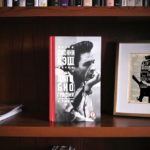In the movie “Walk the Line,” Johnny Cash’s first wife is shown as an evil vixen who did not support his creative endeavors and threw tantrums at him. And June Carter is portrayed as the angel girl who instilled confidence in him, taught him to take responsibility for his life, and eventually he quit drugs, wrote song “Walk The Line” for her and found success in music and personal life. In fact, Cash’s first hit was a love song for Vivian Liberto, and it was very symbolic. She was woman who inspired him to study music, to find his true self and loved him until the end of his days. The film My Darling Vivian is about love, tragedy, loyalty, and the fact that mistakes can be admitted and forgiven.

In 1951, Catholic high school student Vivian Liberto meets handsome 18-year-old Air Force cadet Johnny Cash at a roller rink in San Antonio, Texas. Their summer romance sets the stage for a passionate three-year correspondence that lasted while Johnny was stationed in Germany. After exchanging thousands of letters, they marry upon Johnny’s return in 1954. They move to Memphis, they have Rosanna, and within a year his stellar musical career begins. By 1961, Johnny Cash’s name had become a trademark, his songs were at the top of the music charts and he was constantly touring.
Meanwhile, just two weeks after giving birth to their last child, Vivian moved into their new home in Casitas Springs, California, with her four young daughters. Exhausted by the dangers of tarantulas and rattlesnakes, round-the-clock visits from fans, and growing resentment over her husband’s absence, Vivian found herself on the verge of a nervous breakdown. After Johnny Cash’s drug trial and increased media attention, she and her daughters were targeted by racist groups like the KKK, who expressed hatred for her because of her alleged black race. In the film “My Dear Vivian” we get to know the first Mrs. Cash, whose daughters, Rosanna, Katie, Cindy and Tara, for the first time personally share with us the whole story of love, loneliness, fear, grief and survival.

I already knew that while Cash was in the army, he and Vivian wrote thousands of letters to each other and that they had 4 daughters (Johnny is a jeweler!). And some of the daughters’ memories, about how their mother waited for her father at the window all night and smoked incessantly. The film will be interesting primarily to his fans, but also to anyone who loves authentic stories about the inner underside hiding behind the facade of a successful life.
Rethinking the Hollywood version of the biopic, the documentary tells the true story of Vivian and Johnny. A story that has been distorted for the sake of myth comes to life in this documentary, full of pain but compassion: painful but real.

“My Darling Vivian” has a unique advantage: exclusive, unprecedented access to a huge number of previously unreleased videos and photographs of Vivian Liberto and Johnny Cash, as well as their daughters. Hundreds of photographs of young Johnny, dozens of film fragments from the family archive. Rosanna Cash, Kathy Cash, Cindy Cash and Tara Cash chronologically follow the romantic, painful and life-affirming path of their mother Vivian, shedding light on previously unknown events.













